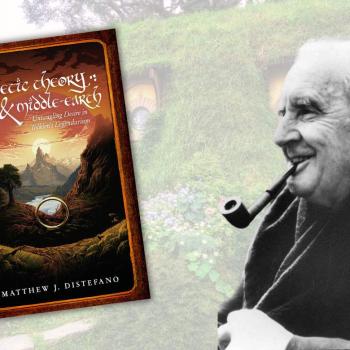
J.R.R. Tolkien was a devout Catholic, which makes some people convinced he could have never been a Universalist. This is a bit of a misnomer, however, given that Catholic theology is quite diverse. After all, like most Christian sects, Catholicism contains a broad range of beliefs and doctrines, many of which contradict one another.
That said, I will admit we have no direct evidence that Tolkien affirmed universal reconciliation (none that I have found, anyway). We can speculate that he was influenced by George MacDonald, who was an out-and-out Universalist, but even if that is the case, it doesn’t mean Tolkien concluded the same things about the fate of humanity. So, what we have to do is speculate based on his Legendarium. That is, we have to do a bit of interpretive work, digging into texts like The Lord of the Rings and The Silmarillion, which – spoiler alert – will give us a bit of a non answer.
Regardless, the first place I want to explore is the creation narrative found in The Silmarillion, called the Ainulindalë. Before creation, the God-figure, Eru Ilúvatar, creates the Ainur, a group of angelic-type beings who perform a great musical arrangement (which is a precursor to the created order, including Middle-earth). The most powerful of the Ainur, Melkor (only later called Morgoth, which may be important), eventually disrupts the melody, creating a dissonant sound (think along the lines of a 7-chord in a major scale). In essence, this is akin to the fall of humankind in Christian theology (Tolkien didn’t want his work analogized but bear with me).
Why do I mention all this? Because Ilúvatar’s response is quite illuminating. He says:
“Mighty are the Ainur, and mightiest among them is Melkor; but that he may know, and all the Ainur, that I am Ilúvatar, those things that ye have sung, I will show them forth, that ye may see what ye have done. And thou, Melkor, shalt see that no theme may be played that hath not its uttermost source in me, nor can any alter the music in my despite. For he that attempteth this shall prove but mine instrument in the devising of things more wonderful, which he himself hath not imagined.” (The Silmarillion, “Ainulindalë”)
So, think of it like this: Melkor is trying to create a dissonance in the melody, but in even creating that, the resolve (ending the melody back on the 1-chord) will be ever more beautiful and satisfying after such a harsh sound (musicians know this). In other words, in attempting to destroy the melody of Ilúvatar, Melkor only makes the ending more beautiful. Think of it like this: Suffering and trauma happen, but God, while not condoning it, can create something good in spite of it.
Does that mean a universalistic ending? It’s hard to say. But there is later evidence that there will be a Second Music of the Ainur that all Men (Men, capitalized, meaning all humans) will take part in:
“But Melkor has cast his shadow upon it, and confounded it with darkness, and brought forth evil out of good, and fear out of hope. Yet of old the Valar declared to the Elves of Valinor that Men shall join in the Second Music of the Ainur; whereas Ilúvatar has not revealed what he purposes for the Elves after the World’s end, and Melkor has not discovered it.” (The Silmarillion, “Of the Beginning of Days”)
To my mind, this screams of a type of Universalism – at minimum, the whole of humanity (called the Atani, of which Hobbits are included) are among those who sing the Second Music of the Ainur (music devoid of the tension found in the First Music).
What about Morgoth, though?
We can’t say. There is a prophecy that after the Dagor Dagorath (the “end times” Battle of all Battles), Morgoth is killed and his spirit is cast out through the Door of Night, into the Void (an uninhabited region of nonexistence outside of Time and Creation). However, even this is ambiguous because of something Tom Bombadil once said:
“Lost and forgotten be, darker than the darkness, Where gates stand forever shut, till the World is mended.”
In other words, the gates of the Void are shut forever . . . until they are not.
Furthermore, the prophecy that says how Morgoth will be killed may be evidence of a restoration of Melkor. How so? Well, it’s just conjecture, and may be a case of hopeful eisegesis on my part, but what if the final destruction of Morgoth is the mechanism that restores Melkor to his original state? That is, it restores Melkor to his proper place among the Ainur. As Tolkien once said, the First Music, of which Melkor was a part of, at one point contained “no flaws.” Meaning: even Melkor was void of flaws. Perhaps the final death of Morgoth returns Melkor to that state!
Regardless of what happens with Melkor, though, there is even more evidence of a type of Universalism in Tolkien’s Legendarium, and it comes from a conversation/debate between an elf called Finrod and a human woman called Andreth. After a lengthy discussion, Finrod says the following:
“If we are indeed the Eruhin, the Children of the One, then He will not suffer Himself to be deprived of His own, not by any Enemy, not even by ourselves.”
What this seems to mean is that, according to Finrod at least, Ilúvatar will not allow either Morgoth or our own corrupted wills to stand against Him forever. At some point, we will join in the Second Music of the Ainur, just as the prophecy states.
Again, does this mean Tolkien had Universalist tendencies? Yes, and no. We can’t conclude anything about Tolkien from this, but at minimum, he included characters that were universalistic in their philosophies.
As always, I will be happy to hear from you, but just be kind in your comments. Admittedly, some of this is conjecture and much of it is interpretation. As I said at the onset, I don’t know of any source material where Tolkien explicitly discusses the topic at hand. In the Legendarium, however, there certainly are some universalistic tendencies, which are open to interpretation.
If you wanna get to know me better, please follow me on social media. I’m pretty active on all platforms:
Also, if you’ve been digging my work on here, and want to see me be able to continue writing as close to full-time as humanly possible, please take a look at my Patreon page at www.patreon.com/mjdistefano. Even $1 a month helps bigly!!!














